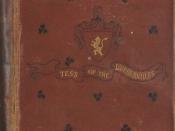Maiden no more(pp. 143-146)Extracts:1,ÃÂThe babyÃÂs offence against society in coming into the world was forgotten by the girl-mother; her soulÃÂs desire was to continue that offence by preserving the life of the child. However, it soon grew clear that the hour of emancipation for that little prisoner of the flesh was to arrive earlier than her worst misgivings had conjectured. And when she had discovered this she was plunged into a misery which transcended that of the childÃÂs simple loss. Her baby had not been baptized. (...)2.
It was nearly bedtime, but she rushed downstairs and asked if she might send for the parson. The moment happened to be one at which her fatherÃÂs sense of the antique nobility of his family was highest, and his sensitiveness to the smudge which Tess had set upon that nobility most pronounced, for he had just returned from his weekly booze at RolliverÃÂs Inn.
No parson should come inside his door, he declared, prying into his affairs, just then, when, by her shame, it had become more necessary than ever to hide them. He locked the door and put the key in his pocket. (...)3.
The infantÃÂs breathing grew more difficult, and the motherÃÂs mental tension increased. It was useless to devour the little thing with kisses; she could stay in bed no longer, and walked feverishly about the room.
ÃÂO merciful God, have pity; have pity upon my poor baby!ÃÂ she cried. ÃÂHeap as much anger as you want to upon me, and welcome; but pity the child!ÃÂShe leant against the chest of drawers, and murmured incoherent supplications for a long while, till she suddenly started up.
ÃÂAh! Perhaps baby can be saved! Perhaps it will be just the same!ÃÂShe spoke so brightly that it seemend as though her face might have...


